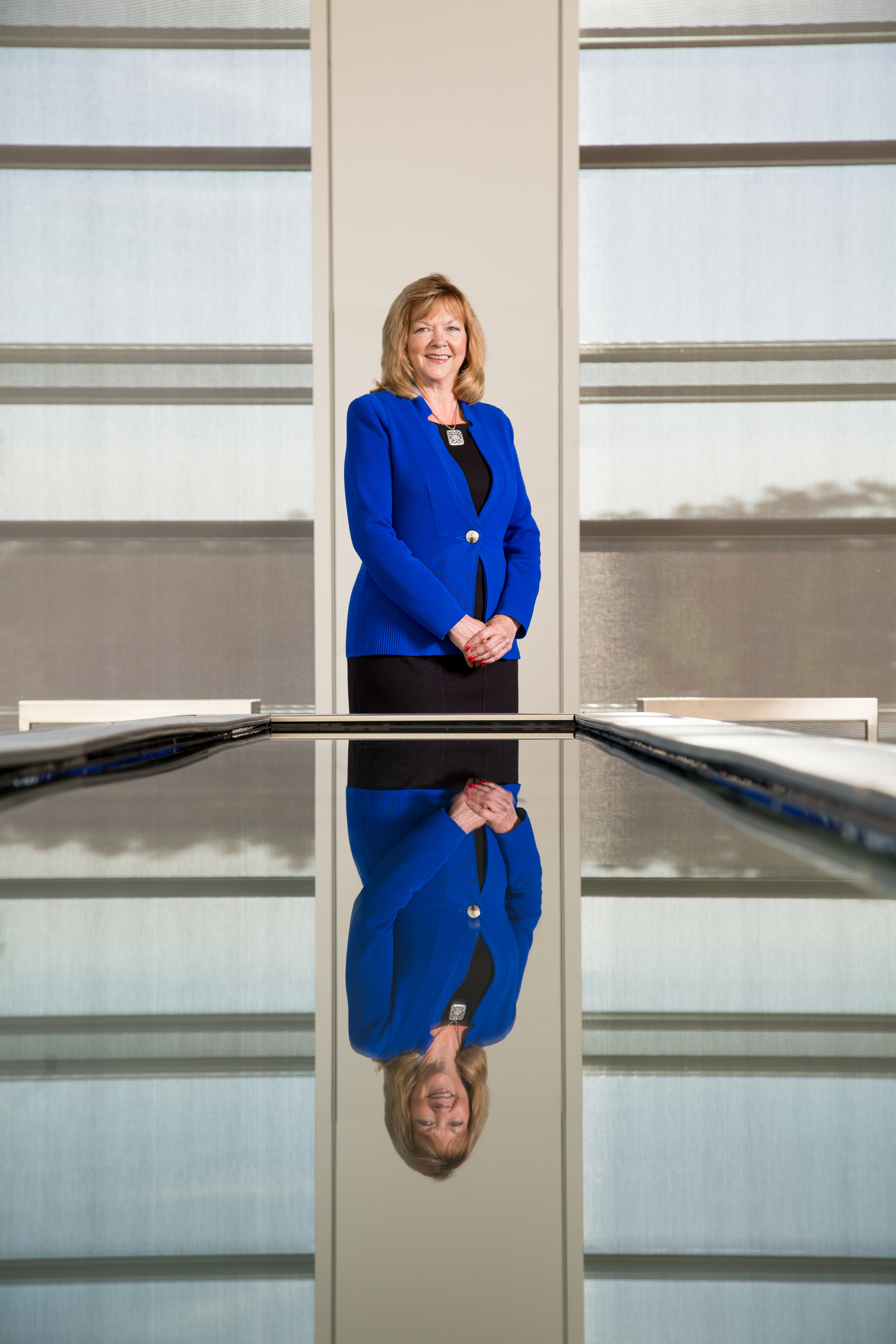
ExxonMobil is the world’s largest publicly traded energy company. XTO Energy Inc., a wholly owned subsidiary acquired in 2010, is responsible for its unconventional business—using and advancing technologies that extract oil and gas from shale rock formations. With 4,700 employees, XTO owns interests in approximately 55,000 active oil and gas wells and holds 11 million acres in the United States, Canada and Argentina. One Texas Engineer leads it all.
As president of XTO, Sara Ortwein charts the course for the company’s success, overseeing everything from drilling and production operations to team development to budgeting and cost management.
After graduating with her bachelor’s degree in civil engineering from the Cockrell School of Engineering in 1980, Ortwein felt drawn to the fast pace and intensity of the energy industry and joined ExxonMobil as a drilling engineer. Over her 37 years with the company, she has served in prestigious executive roles, developing a keen sense for team building and leadership in a volatile industry.
We sat down with Ortwein to gain insights into how she leads and develops successful teams that improve the efficiency, effectiveness and profitability of one of the world’s top companies.
What is your leadership philosophy, and how has it evolved over time?
I received my first supervisor assignment after only five years with ExxonMobil. I was leading a group of people who had far more experience than I did, and I spent most of my first year in that role struggling to find how I could add value. But then I came to the realization that it wasn’t my job to know more than the people around me—it was my job to enable them to apply their strengths to whatever challenges and opportunities we faced. Now, as president, I know I’m not here to have all the answers. I’m here to find and develop the right people and allow them to use their capabilities to move us forward.
What skills and attributes do effective leaders possess?
Integrity, honesty and candor are at the top of the list. If people can’t trust you, they won’t know whether they should follow you. Good leaders also need what I call innate optimism. You have to be able to see opportunities where others see challenges and then rally your team around seizing those opportunities.
How do you build a strong team?
As a leader, you have to be able to see potential in people and understand their unique skills. You must also have a good understanding of your own strengths—and your blind spots. Surround yourself with people who fill those gaps and think differently than you do. You need people who are willing to put their ideas on the table and debate with you so you can test your own views. This is especially important after you have been in leadership roles for a long time and have a strong vision for where you think the business should go.
What is the biggest challenge of being president?
At the end of the day, you have to know when it’s time to synthesize all the input and feedback from your team and make the tough decisions that can, at times, impact the whole organization. It’s a fine balance—creating an open, collaborative team environment and then pulling everything together and setting a direction as the leader. The buck stops with you.
How do you build a work environment that attracts and supports diverse employees?
It’s important to create an environment that allows people to bring their full selves and natural personalities to work. I’ve learned over time that I’m most effective if I can be myself rather than trying to fit into a certain mold. I’m female, and I approach things differently because of that and because of how I was raised. I like humor in the workplace. I’m an open and relatively casual person. If I try to be more reserved or shape myself into someone I’m not, it just doesn’t work. Additionally, you need policies in place that help employees manage through difficult times. All of us, whether male or female, go through periods in life when you need some flexibility, whether it be having children, recovering from illness or taking care of aging parents.
Why is it important for companies in the energy industry and other STEM fields to recruit and retain women?
For many years, I had a hard time answering questions around women in the workforce and my experiences. My approach was always to work as hard as I could and become the expert at whatever I was doing because I didn’t want anyone to question whether I had earned my success. But in the early 2000s, I worked for a male executive who helped me understand the business perspective behind recruiting and retaining women at ExxonMobil. It’s a business imperative that we attract and cultivate the best minds. The challenges of tomorrow will be solved with technology, and we need the brightest individuals, regardless of gender, race or ethnicity, with aptitudes and interests in STEM, to confront those challenges. As a society, it is important that we do a better job of encouraging women and underrepresented minorities to pursue interests in science and math from grade school through university to ensure we are accessing the entire talent pool.
Ortwein and her husband Randy have two children, Adam (B.A. Architecture 2009) and Megan (B.S. Public Relations 2017). As a family, they enjoy golf, tennis and travel. Ortwein is an active member of the UT Austin community, serving as chair of the Cockrell School’s Engineering Advisory Board and a member of the University of Texas System Chancellor’s Circle.